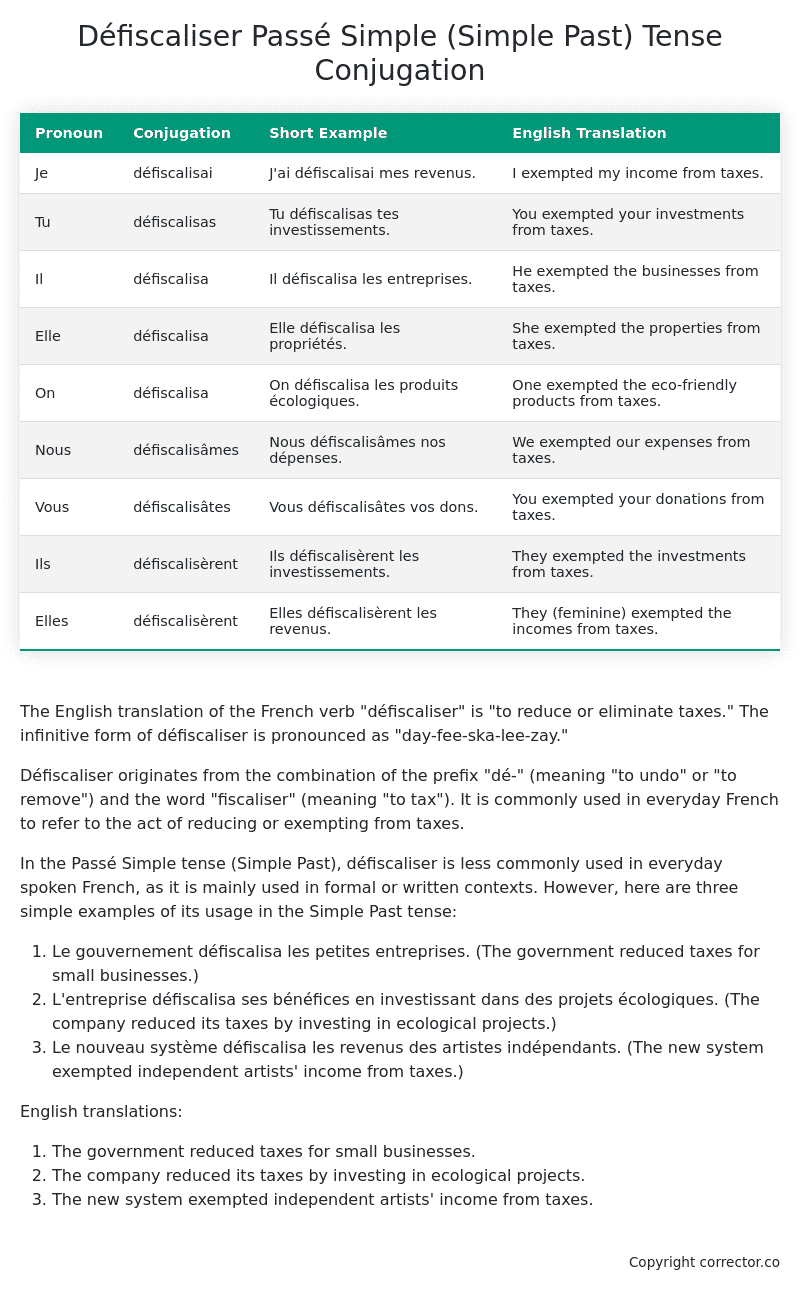Passé Simple (Simple Past) Tense Conjugation of the French Verb défiscaliser
Introduction to the verb défiscaliser
The English translation of the French verb “défiscaliser” is “to reduce or eliminate taxes.” The infinitive form of défiscaliser is pronounced as “day-fee-ska-lee-zay.”
Défiscaliser originates from the combination of the prefix “dé-” (meaning “to undo” or “to remove”) and the word “fiscaliser” (meaning “to tax”). It is commonly used in everyday French to refer to the act of reducing or exempting from taxes.
In the Passé Simple tense (Simple Past), défiscaliser is less commonly used in everyday spoken French, as it is mainly used in formal or written contexts. However, here are three simple examples of its usage in the Simple Past tense:
- Le gouvernement défiscalisa les petites entreprises. (The government reduced taxes for small businesses.)
- L’entreprise défiscalisa ses bénéfices en investissant dans des projets écologiques. (The company reduced its taxes by investing in ecological projects.)
- Le nouveau système défiscalisa les revenus des artistes indépendants. (The new system exempted independent artists’ income from taxes.)
English translations:
- The government reduced taxes for small businesses.
- The company reduced its taxes by investing in ecological projects.
- The new system exempted independent artists’ income from taxes.
Table of the Passé Simple (Simple Past) Tense Conjugation of défiscaliser
| Pronoun | Conjugation | Short Example | English Translation |
|---|---|---|---|
| Je | défiscalisai | J’ai défiscalisai mes revenus. | I exempted my income from taxes. |
| Tu | défiscalisas | Tu défiscalisas tes investissements. | You exempted your investments from taxes. |
| Il | défiscalisa | Il défiscalisa les entreprises. | He exempted the businesses from taxes. |
| Elle | défiscalisa | Elle défiscalisa les propriétés. | She exempted the properties from taxes. |
| On | défiscalisa | On défiscalisa les produits écologiques. | One exempted the eco-friendly products from taxes. |
| Nous | défiscalisâmes | Nous défiscalisâmes nos dépenses. | We exempted our expenses from taxes. |
| Vous | défiscalisâtes | Vous défiscalisâtes vos dons. | You exempted your donations from taxes. |
| Ils | défiscalisèrent | Ils défiscalisèrent les investissements. | They exempted the investments from taxes. |
| Elles | défiscalisèrent | Elles défiscalisèrent les revenus. | They (feminine) exempted the incomes from taxes. |
Other Conjugations for Défiscaliser.
Le Present (Present Tense) Conjugation of the French Verb défiscaliser
Imparfait (Imperfect) Tense Conjugation of the French Verb défiscaliser
Passé Simple (Simple Past) Tense Conjugation of the French Verb défiscaliser (You’re reading it right now!)
Passé Composé (Present Perfect) Tense Conjugation of the French Verb défiscaliser
Futur Simple (Simple Future) Tense Conjugation of the French Verb défiscaliser
Futur Proche (Near Future) Tense Conjugation of the French Verb défiscaliser
Plus-que-parfait (Pluperfect) Tense Conjugation of the French Verb défiscaliser
Passé Antérieur (Past Anterior) Tense Conjugation of the French Verb défiscaliser
Futur Antérieur (Future Anterior) Tense Conjugation of the French Verb défiscaliser
Subjonctif Présent (Subjunctive Present) Tense Conjugation of the French Verb défiscaliser
Subjonctif Passé (Subjunctive Past) Tense Conjugation of the French Verb défiscaliser
Subjonctif Imparfait (Subjunctive Imperfect) Tense Conjugation of the French Verb défiscaliser
Conditionnel Présent (Conditional Present) Tense Conjugation of the French Verb défiscaliser
Conditionnel Passé (Conditional Past) Tense Conjugation of the French Verb défiscaliser
Conditionnel Passé II (Conditional Past II) Tense Conjugation of the French Verb défiscaliser
L’impératif Présent (Imperative Present) Tense Conjugation of the French Verb défiscaliser
L’impératif Passé (Imperative Past) Tense Conjugation of the French Verb défiscaliser
L’infinitif Présent (Infinitive Present) Tense Conjugation of the French Verb défiscaliser
L’infinitif Passé (Infinitive Past) Tense Conjugation of the French Verb défiscaliser
Le Participe Présent (Present Participle) Tense Conjugation of the French Verb défiscaliser
Le Participe Passé (Past Participle) Tense Conjugation of the French Verb défiscaliser
Struggling with French verbs or the language in general? Why not use our free French Grammar Checker – no registration required!
Get a FREE Download Study Sheet of this Conjugation 🔥
Simply right click the image below, click “save image” and get your free reference for the défiscaliser Passé Simple tense conjugation!

Défiscaliser – About the French Passé Simple (Simple Past) Tense
Formation
Usage
Narration
Historical Context
Interactions with other tenses
Passé Composé
Imparfait
Conditional and Subjunctive
Summary
I hope you enjoyed this article on the verb défiscaliser. Still in a learning mood? Check out another TOTALLY random French verb conjugation!


